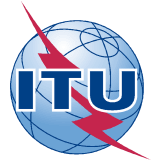
ITU is the United Nations specialized agency for information and communication technologies – ICTs. They allocate global radio spectrum and satellite orbits, develop the technical standards that ensure networks and technologies seamlessly interconnect, and strive to improve access to ICTs to underserved communities worldwide.
ITU is committed to connecting all the world's people – wherever they live and whatever their means. Through their work, they protect and support everyone's fundamental right to communicate.
Membership
An organization based on public-private partnership since its inception, ITU currently has a membership of 193 countries and over 700 private-sector entities and academic institutions. ITU is headquartered in Geneva, Switzerland, and has twelve regional and area offices around the world.
ITU membership represents a cross-section of the global ICT sector, from the world's largest manufacturers and carriers to small, innovative players working with new and emerging technologies, along with leading R&D institutions and academia.
Founded on the principle of international cooperation between governments (Member States) and the private sector (Sector Members, Associates and Academia), ITU is the premier global forum through which parties work towards consensus on a wide range of issues affecting the future direction of the ICT industry.
What does ITU do?
ITU has three main areas of activity organized in ‘Sectors’ which work through conferences and meetings.
Radiocommunications
ITU's Radiocommunication Sector (ITU-R) coordinates this vast and growing range of radiocommunication services, as well as the international management of the radio-frequency spectrum and satellite orbits. An increasing number of players need to make use of these limited resources, and participating in ITU-R conferences
and study group activities – where important work is done on mobile broadband communications and broadcasting technologies such as Ultra HDTV and 3D TV – is becoming an ever-higher priority for both governments and industry players.
Standardization
ITU standards (called Recommendations) are fundamental to the operation of today’s ICT networks. Without ITU standards you couldn’t make a telephone call or surf the Internet. For Internet access, transport protocols, voice and video compression, home networking, and myriad other aspects of ICTs, hundreds of ITU standards allow systems to work – locally and globally. For instance, the Emmy award-winning standard ITU-T H.264 is now one of the most popular standards for video compression.
In a typical year, ITU will produce or revise upwards of 150 standards covering everything from core network functionality to next-generation services such as IPTV.
Development
ITU's Telecommunication Development Sector (ITU-D) has a programme to offer you – whether you are interested in entering or expanding your presence in emerging markets, demonstrating global ICT leadership, learning how to put good policy into practice, or pursuing your mandate for corporate social responsibility. In an increasingly networked world, expanding access to ICTs globally is in everybody's interest. ITU champions a number of major initiatives which encompass ITU's internationally-accorded mandate to ‘bridge the digital divide’, such as its ITU Connect events or Connect a School, Connect a Community. ITU also regularly publishes the industry’s most comprehensive and reliable ICT statistics.


